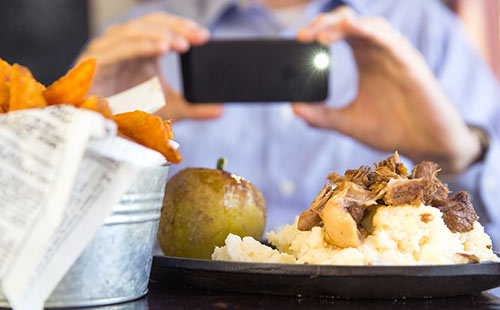最近發(fā)表的一篇研究表明:分享或關(guān)注網(wǎng)上食物的照片會(huì)使得我們對(duì)食物的滿意程度下降。實(shí)驗(yàn)顯示,某種食物的圖片看到的越多,人們?cè)讲幌矚g吃那種食物。

Problem: On the scale of problems, “pictures of food on the Internet” is firmly first-world. And that is almost certainly a too-generous definition of “problem.” When it comes to Instagramming your dinner, I say live and let live, you know? Maybe your salad was particularly aesthetically pleasing that night, and I, too, have wiled away many an hour clicking “random” on Smitten Kitchen and salivating.
But I assume if you’re making the effort to arrange your food artfully and preserve its memory in a digital archive, you must... like food. And want it to taste good. A recent study published in theJournal of Consumer Psychologysuggests that spending time focusing on images of food makes the food itself less satisfying.
Methodology: The researchers hypothesized that imagining enjoying something might lead to satiation—the feeling that makes the second piece of cake taste not-quite-as-good as the first. To test this, they had undergraduates participate in two experiments that they were told were separate—one in which they rated how appetizing different photos of food looked, and one in which they ate some peanuts and rated how much they enjoyed them.
A separate group of people did the same experiment again, but in the photo-rating portion, some were asked to rate how appetizing the food was or to choose a preference between two foods, and some were asked to rate the brightness of the photo itself.
Results: The more photos of food people looked at, the less they enjoyed the peanuts—if they were looking at photos of salty food. People who perused images of sweets enjoyed the peanuts more, suggesting that imagination causes satiation only if you’re imagining a similar food. In the second experiment, participants who focused on the brightness of the photos were able to enjoy the peanuts more than those who were thinking about the deliciousness of foods while they looked at the images.
Implications: You’ll probably enjoy your food more if you don’t take a picture of it, or scroll through images of burritos at work and then eat one when you get home. This also has potential implications for advertisers, who may unknowingly be giving away satiation for free when they dangle tantalizing images of chicken wings or whatever in front of us all day long. But luckily the study provides a loophole for determined Instagrammers: Try not to think about the food’s taste while you take a photo—just focus on your composition.
The study, "Satiation from sensory simulation: Evaluating foods decreases enjoyment of similar foods," appeared in the Journal of Consumer Psychology.
相關(guān)閱讀
(來源:中國日?qǐng)?bào)愛新聞iNews 丹妮 編輯)
